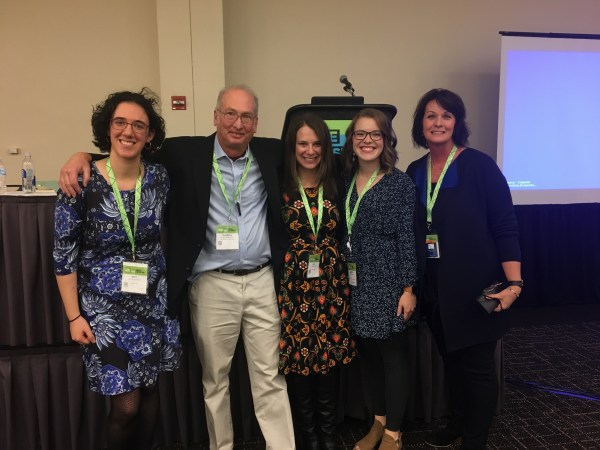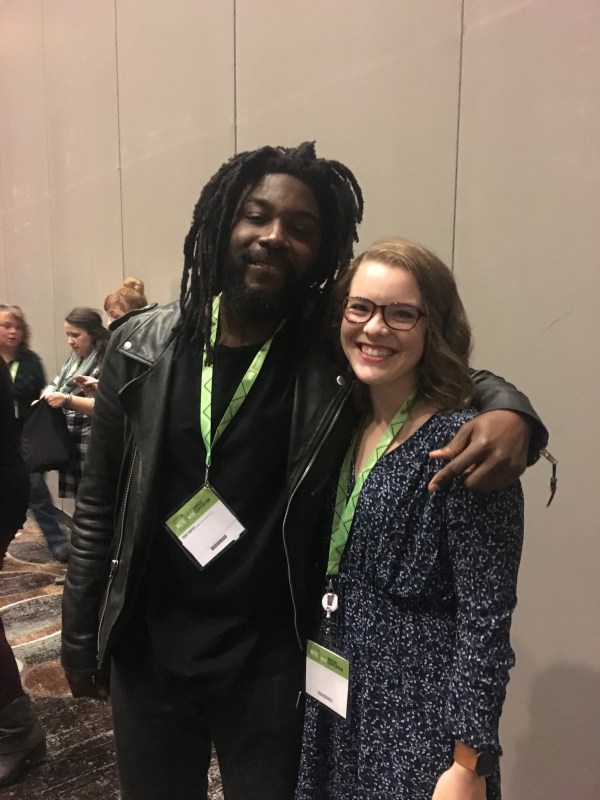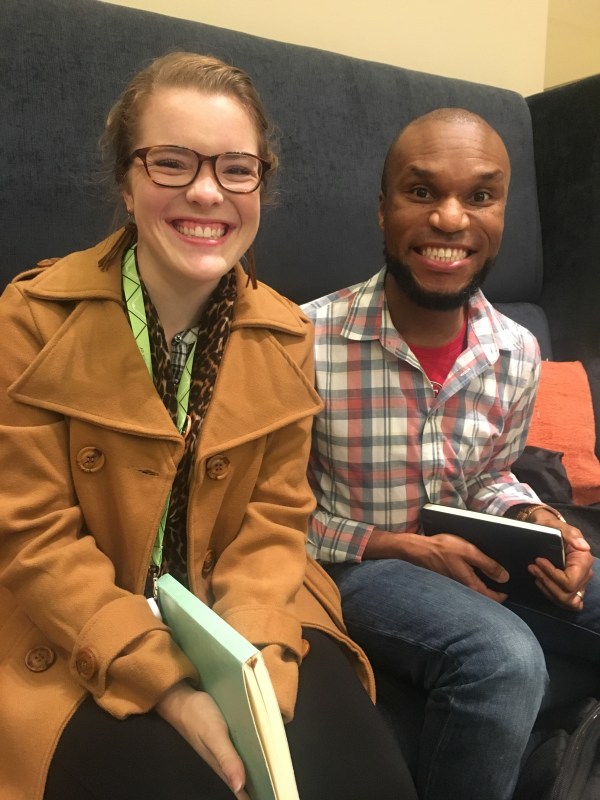
I feel like I overuse the word “mind-blown” in my everyday life, and people who know me well are unphased when I hand gesture and raise the volume of my voice to describe whatever happened that elicited such a response.
But trust me when I say, this time IT IS NOT A DRILL.
My first-ever experience with NCTE can only be described in one–though overused by me–word. You guessed it.
MIND. BLOWN. Okay, wait. Two words, with necessary periodic addition for dramatic effect.
In order to fully communicate this mind-blown state, I should tell you that my NCTE experience began with sitting in the airport and seeing Jason Reynolds walk right in front of me as I froze like a teenage girl.

Then, I redeemed myself by attending a panel with Jason Reynolds and getting a picture. I also awkwardly told him, “Hey, I saw you yesterday, but I tripped on my way over to you and got embarrassed and then sat down.” Good story, Jess. He said, “Oh, you should’ve said something!” He’s probably used to crazies.
Anyway, aside from my intense awkwardness and wondering whether or not I should walk up to people I know from Twitter and say “hello”–like the friends I feel we are–, attending NCTE for the first time was an invaluable experience for a few reasons.
First, it helped validate that I’m–we’re–fighting the good fight. To be honest, our profession is so steeped in what Carol Jago calls “literacy activities,” I sometimes wonder if I’m the only teacher just letting her kids read and providing space for them to write. Anyone else? Feeling like The Lone Ranger can also cause me to question: If this is different than the way almost everyone is doing it, is there a chance I’m wrong? That insecurity causes many issues, one of which results in the frequent depletion of my chocolate stash. However, NCTE took all that wondering away, and reaffirmed the Workshop Crusade during every session:
Kelly Gallagher said, “I am a teacher of literaCY, not literaTURE.”
Jimmy Santiago Baca, “In working with students who hate education, we need to make it look a lot less like education.”
He also said, “Make your classroom as individual as you can to affirm your own spirit.” And I would argue, we need to do so in order to affirm the spirits of our kids, as well.
Second, as a result of an amazing session led by Tricia Ebarvia (who is my bestie, but doesn’t know it yet), Anna Osborn (who I want to be when I grow up), and Kate Flowers (who is not afraid to tell the truth of data), I obtained a litmus test that will challenge me for the rest of my teaching career.
Kate Flowers’ Rule of Assessment: Do no harm.
As I really let this three-word, doozy of a sentence sink in, I started running a list of what I would deem “assessments” from the past three months. I teach three very different classes: On-level Seniors, AP Lang Juniors, and All-level Creative Writing. I can honestly say the only class I can say I’ve “done no harm” in terms of assessment is Creative Writing. Do I know where they are? Absolutely. Do I know their strengths? Interests? What they had for breakfast this morning? What they dream about for their futures? Absolutely. Do they love and support each other as classmates? To a fault.
So, the tough question is, why do I run my other classes any differently? Truth: Because of assessments. Because of administrative checkpoints. Because I feel as though I have to justify community-building and students being seen to align with state and district standards. Finally, because I have not completely let go of control.
Kate asked, “Is this about your need to control? Or are you serving your students’ need to grow?”
This question also made me think: How many times do our educational practices do more to breed liars than learners?
Those questions should keep me busy for awhile.
Do no harm.
Finally, NCTE made me even more angry at the conversations that permeate the teacher work rooms, the hallways, the classrooms with doors closed and hands thrown up in the air.
I constantly hear, “My kids can’t do this, and they can’t do that. Why have they not been taught this before?”

Cornelius Minor said, “Your lack of understanding is not a symptom of something wrong. It just means you’re in the right place.”
I am a teacher. I’m not an assigner. I’m not an assessor. I don’t throw something against a wall, hope it sticks, and then blame the wall for not having been told to grab onto it because it will be useful in the future.
As I said in my portion of our Three Teachers’ talk, maybe kids have been told, but they haven’t been taught.

So, my current plight is trudging through the constant overwhelm of asking people to be open to change, trying something new, doing things differently. My volleyball coach ALWAYS reminded us of the definition of insanity–but he called it “stupid,” instead. Insanity is doing the same thing over and over and expecting different results. So I will continue to toss up the idea that we should let students show us who they are, and then plan a learning experience around that. We might even set some learning in place that might help them discover a piece of themselves they didn’t know existed, or a person they were blind to before they knew their struggles were the same.
I remember what Tom Newkirk said, “Story is compelled by trouble.” So maybe this is part of my story, maybe this is my trouble. Maybe I was meant to push through the difficulty and the seemingly impossible–at least without a steady stream of caffeine and sarcasm–to get to what truly might save our world, beautiful words and the connections they fuse when we encounter them.
Jessica Paxson teaches English IV, AP Lang, and Creative Writing in Arlington, TX. She runs on coffee and exaggeration, and is overjoyed to be in a graduate program because that means she has access to a better library. She is currently twiddling her thumbs as she waits for the next books from Sabaa Tahir, Sandhya Menon, and Jason Reynolds. Also, you can probably find her humming Christmas tunes over the sounds of her students’ pained groans.



[…] as I mentioned in my last post, all of my classes do not look like this, […]
LikeLike
This is EXACTLY how I feel at school AND how I felt as a first-timer at NCTE! It’s good to know that I’m not alone and NCTE did so much to reassure and rejuvenate my passion for what I do.
LikeLike
Can I hear more about the difference between literacy activities and workshop approach activities? I’m afraid I don’t know the difference.
LikeLike
Kristin, thanks for your question! I am by no means an expert of any kind. However, I think the goal is not to breakdown the process of literacy so much that it no longer looks like real reading and real writing. The focus in my own planning is usually, do real readers do this? Do real writers do it? Do real readers make dioramas after reading a great book? I hope not. Do real readers critically review books and share/gush over them with friends? Absolutely. Do real writers use a graphic organizer for a prompt they have no personal connection to? I don’t. Do real writers look to other great writers as a guide for their own craft? Of course! Activities should never take the place of a whole lot of real reading, and a whole lot of real writing. I hope that makes sense! Feel free to keep the questions coming.
LikeLike
Love your response and now feeling like I’ve been committing malpractice these past ten years 😬. I love the questions you ask yourself and want to make the move towards that direction. Could you just explain for me (I teach at an urban vocational HS so my students tend to need a lot of support and remediation) how I can move more towards this type of teaching but also supporting them to understand the difficult texts (both choice YA titles but also classics like The Great Gatsby?
LikeLike
Kristin, I think we all feel like we’ve committed malpractice at some point in our careers. Even now, after I’ve taught for years, fully immersed in the philosophies and routines of workshop, I feel the tug at times. I blame it on the worry that I may not be able to do enough to help my kids. I also teach students who need lots of support and remediation, so I worry a lot.
While there is not magic bullet approach, Jessica’s questions can help us stay grounded in the best practices that work for all students as they grow as readers and writers. I’ll add a few: How can my readers show they understand what they read without completing worksheets, writing book reviews or summary after summary? How can my readers show they are making personal and global connections to what they read — like mirrors, windows, and doors? How can we write by studying mentor sentences, paragraphs, and full-blown texts to show us the structure, word choice, and style that real writers use to craft meaning? How can I write beside my students to model the thought process and struggle it takes to write well?
LikeLike
Amy,
Thank you for your response. I hope you don’t find me scrupulous (although that is me to a fault) with my previous questions. I guess, in addition to the wonderful questions both you and Jessica posed, what would be an actual example of a “literacy activity” versus “what real writers/readers do” activity?
Example– A close reading activity where students are going back into the text to examine character, symbolism, etc. feels like a literacy activity because I don’t think a real writer/reader would do that. But in terms of the Common Core, close reading is a “good” task for students to do.
As someone very new to the workshop routine, I want to make sure I’m “doing it right”–which I know is not an easy answer.
Thank you again and I just wanted to add–big fan of the work you all are doing to support and challenge what we do as teachers :).
LikeLike
Sorry for the late reply. I get what you mean about going back into a text to examine character, symbolism, etc feeling like a literacy activity. Sure, it is — and some real readers/writers do that. Those of us who love to discuss literature do. Literature majors do. Right? While I want to claim I always only do what real readers/writers do with my students, I do still have to teach standards. That means close reading with a targeted focus on specific literary elements. This is where balance comes in. If we only do that, we deprive students of the flow in reading that leads to pleasure and joy. That’s my biggest gripe with a constant barrage of whole class novels — and the topic of Kelly Gallagher’s book Readicide. Also, I remember hearing Donalyn Miller say that children who read come to understand all these “literary” things we do with kids on their own. They may not be able to put names to literary elements and devices, but those kids who read a lot can easily identify them, discuss and analyze them because they already understand what they do for meaning. I know this is true — based on my own experience as a young reader and in the students I teach who already read before they come to me.
Does that make sense?
LikeLike
“I sometimes wonder if I’m the only teacher just letting her kids read and providing space for them to write. Anyone else?”
YES! I was feeling this same way yesterday when a colleague showed me her extremely detailed slide-show about “characterization.” I do think it’s necessary to provide direct instruction some time, but so much comes from just letting kids read, talk, and write. They GET stories; they can talk about characters and setting and plot. Even if they don’t use words like “indirect characterization” they are still talking about it.
Thanks for this post. I too was a first timer at NCTE this year.
LikeLiked by 1 person
For a first-timer, it’s just so overwhelming. I feel like I’ll have a better plan of attack next year. I feel you on the overkill of telling kids about the skills we want them to have, rather than just showing them through what good writing looks like.
LikeLike